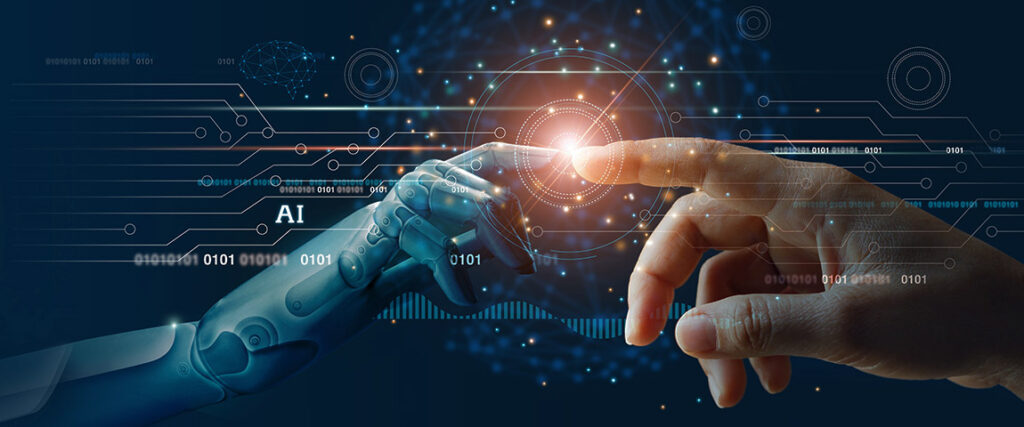As days are getting smarter as do humans, the technology is also improvising in all possible ways to ease the process and to assist humans. Artificial Intelligence is a like one, which impacted, impacting and will impact the world to the optimizing extent. At times, the technology is mistaken as robotics and to be clear, Artificial Intelligence is a technology that is implemented in the field of robotics. It’s a branch of tech that simulates the human brain in machines.
What Artificial Intelligence means?
Artificial intelligence is an emerging technology wherein machines and systems are simulated or imparted human intelligence, for performing automatic assertions and achieving the task through natural intelligence.
Artificial intelligence is colloquially the machines that mimic the ‘cognitive’ functions of the humans associate with the human mind, such as learning and problem solving.
The technology analyzes the environment, assess them with the given algorithm or data and sort out the best path to meet out the goals. Here, the goals can be predefined or induced by the machine itself through prior experiences, called reinforcement learning.
The most befitting approach to AI (out of four) inspired by human brain’s work, is that : “artificial neural network approach that uses artificial neurons that learns itself by the desired output and altering the strength of its connections with internal neurons to ‘reinforce’ connections that seemed to be useful”.
Did You Know?
The term 'Artificial Intelligence' was first coined in 1956 to differentiate the field with 'cybernetics'.
Unfolding Artificial Intelligence
As said above, the tech analyzes the situation and perform the task intellectually by its own. For instance, let we look on to chess.
1. Analyzing :
- At first, the machine is given initial instructions and play of the specific coins and rules and goal of the game.
- It is fed with data that seeks to checkmate the opponent, while doing so it checks if its own plays are safe.
- If attacked by a coin, it ensures first the cover of the coin and then linger the game.
2. Interpreting / Simulating:
Whilst the game, machine also interprets what could be the next move of the opponent just as the human thinks. It relies this with the data if any dismissals of its coin can occur and successfully manipulate to avoid it.
3. Manipulating/Decision making:
By correlating the analyzed and simulated part, the machine concludes to perform the plays of specific coins in motive to rule out the opponent.
Like so, subsequent information concerning the play is catered and the system/ machine inspect every move in order to achieve the goal, to win the game.
Deep Blue is the first AI-cum-computer chess playing system to beat a reigning World Champion, Garry Kasparov on May 11, 1997.
Whilst achieving this, the machine also ensures to plan out the simplest step possible rather going to complex ones, unless complexity is substantially preferred (as in the case of overfitting). However, some problems may lead to ‘combinatorial explosion’, a case that takes exponential time to solve, as the complexity increases.
Thus, unfolding artificial intelligence makes the machine to catch on reasoning, problem solving, acknowledging, planning, learning, decision making, natural language processing, perception and ability to manipulate.
Applications
AI had become pervasive due to its high productive and effectual approach, assisting humans. Starting from your tech-hand’s facial recognition to successive operating in hospitals, AI’s achievements peaks its demands. Out of the major, few are explained here:
- AI has a profound impact in health, assisting doctors. Example, AI reads the medical details to go whether for ECG / CT / other checkups. It helped to diagnose the cancer patients effectively with the best out of 800 medicines and vaccines, based on the medical data of the victim, thus easing the work of doctors, according to Bloomberg Technology.
- The biggest enrichment AI had done to this field is ‘Self-driving’ vehicles. Here, the AI is implied to every essential component that works on by driver’s move, viz braking, steering, collision prevention, navigation and mapping and these AI-powered systems conjointly make a complex ‘Self-driving’ cars.
- AI has also enabled to analyze the stocks by interpretation of data and examining it, for efficient marketing and financial trading. It is also implemented in banks to route the usage of unauthorized debit cards.
Read : 3rd Generation of Artificial Intelligence – Neuromorphic Computing
Likely, its spread is seen in almost every sectors. JackMa once controversially predicted that AI CEO’s are 30 years away. AI’s impact is increasing, constantly reminding of that it will replace of the work of humans within one or two decades.
Cons of AI :
Every coin has its two sides. To speak the other side of AI, digital warfare and human obsoleteness, the major two cons.
“I think the dangerous applications for AI, from my point of view, would be criminals or large terrorist organizations using it to disrupt large processes or simply do pure harm. [Terrorist could cause harm] via digital warfare, or it could be a combination of robotics, drones, with AI and other things as well that could be really dangerous”.
–Irakli Beridze (Head, Artificial Intelligence and Robotics, UNICRI, United Nations
“The development of full artificial intelligence could spell the end of the human race. Once humans develop artificial intelligence, it will take off on its own and redesign itself at an ever-increasing rate. Humans, who are limited by slow biological evolution, couldn’t compete and would be superseded”
– Stephen Hawking

